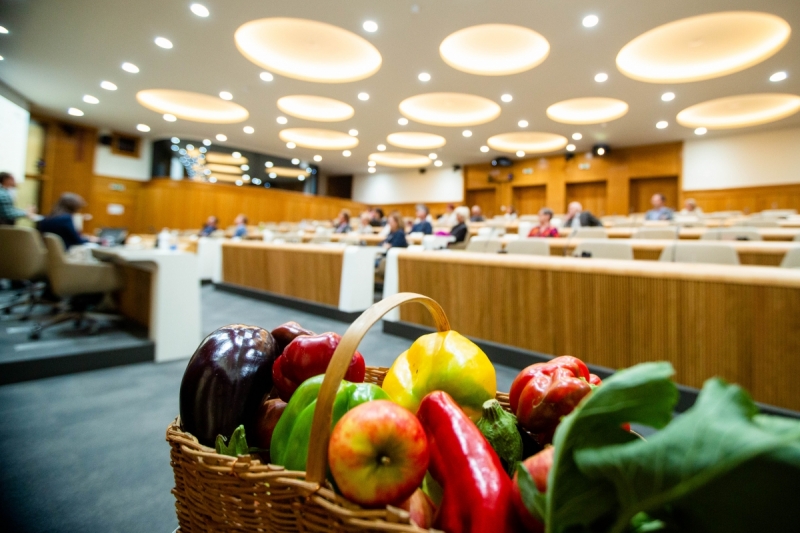Ecological transition starts with agronomy, increasing IPM uptake with biocontrol and significant pesticide dependency reductions
On 20 October 2022, PAN Europe, in collaboration with IBMA (International Biocontrol Manufacturers Association), IOBC (International Organisation for Biological / Integrated Control) and the National Council of the Republic of Slovenia, hosted an international symposium titled “Ecological transition starts with agronomy, increasing Integrated Pest Management uptake with biocontrol, and significant pesticide dependency reductions”.
The participants, representatives of politics, non-governmental organizations, professions and farmers participated in the event to find answers to the questions of how to reconcile the EU goals of reducing pesticide consumption with national plans for the future of agriculture in Slovenia.
The protection of human health, nature and the environment with the reality of farming, especially in the light of national goals on food self-sufficiency, were discussed, resulting in solutions that could help national decision-makers to align with the EU goals, by introducing approaches that have already proven to be very successful in practice to growers.
Cvetko ZUPANČIČ, President of the Commission of the National Council for Agriculture, Forestry and Food, in his opening address highlighted the importance of the consultation as an insight into alternative methods of farming that are more environmentally friendly. With which we can produce healthy, safe food, yet in sufficient quantities and last but not least at affordable prices. Food security is of utmost importance. The Commission of the National Council for Agriculture, Forestry and Food is constantly pointing out the poor state of Slovenian agriculture, the country's step-motherly attitude towards agricultural policy, which results mainly in the ever-decreasing scale of food production, in the ever-increasing abandonment of farming and thus ever-increasing nutritional dependence on of food imports. In Slovenia, agriculture is also extremely important for the preservation of the cultural landscape, population and rural development, so much more attention should be paid to agricultural policy and it should be defined as one of the pillars of national security. He concluded that such events are an opportunity to learn about alternatives to farming in this expensive crisis, which do not require so much mineral fertilizers and phytopharmaceuticals, on which we are almost entirely dependent on imports, and in this way make our contribution to conservation environment also through sustainable farming.
Branko Tomažič warned of the alarming state of Slovenian agriculture, as the Report on the State of Agriculture, Food, Forestry and Fisheries in 2021 shows the worst economic results to date, while the data for this year are also worrying.
Maša Žagar, Acting Director General of the Directorate for Agriculture, Branko TOMAŽIČ, Vice President of the Commission of the National Council for Agriculture, Forestry and Food participated in the panel on the work of joint work of European and Slovenian institutions to provide support for Slovenian transition to agroecology. Dr Christian HUYGHE, Scientific Director of INRAE, presented the innovations that are, as observed, way ahead of Slovenian practices, and hopefully, good solutions to address the high pesticide consumption in Slovenia. The paths to a future without pesticides were discussed by Franc BOGOVIČ, a member of the European Parliament. Zvone ČERNELIČ, Slovenian biodynamic farmer, Aleš FISTER, Slovenian organic farmer. The latter presented their concrete work on their farms and gave good practices. Dr Matjaž GLAVAN from the Faculty of Biotechnology, University of Ljubljana, presented the studies of the SPRINT project in Slovenia, pointing out the pesticide residues in our environment and in our bodies. Lene SIGSGAARD, University of Copenhagen, Dr Jaka RAZINGER, Agricultural Institute of Slovenia, and Jennifer LEWIS, Executive Director of IBMA talked about the ways that biocontrol can contribute to reducing the use of synthetic pesticides.
Meta VRHUNC, the star of biodynamics in Slovenia sent out a strong call to ban glyphosate and to turn toward working with nature. Marija MARINČEK, president of the Associations of Organic Farmers of Slovenia, Dr Mihael KASAŠ, president of the Association Demeter Slovenia and prof. dr. Martina BAVEC, University of Maribor, Slovenian ambassador of organic agriculture gave a preview of the state of play of organic production in Slovenia.
The meeting was coordinated by PAN Europe representative Natalija SVRTAN.
In his closing speech, David CARY, a board member of PAN Europe, emphasized that we must learn something from past mistakes, as dependence on multinational companies is a big problem in agriculture today, so we need solutions that will not harm society (health, the environment...) and they will be primarily sustainable. At the same time, he pointed out that 60 years ago, the book "Silent Summer" by the writer Rachel Carson was published, and since then we have had a clear warning about the dangers of pesticide use, and it is about time we start to listen to it.
As the speakers noted, in Slovenia we have relatively rich experience with alternative, environmentally friendly farming methods, and with the goal of preserving healthy fertile land on which we will grow enough food, it is essential to nurture and expand them in the future as well. Those present concluded that the education of farmers and experts, the presentation of good practices and the implementation of this knowledge and experience are extremely important. This event is certainly a good step in this direction.
